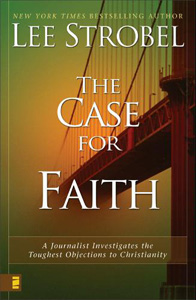The Case for Faith: A Journalist Investigates the Toughest Objections to Christianity

Lee Strobel’s book shows a heavy influence from his time as a journalist, an influence he makes no attempt to deny or diminish. This book, like his others in his “The Case for…” series, relies heavily upon the reasoning and logical deduction he learned as a reporter with the Chicago Tribune. So it came as no surprise when he logically ordered the interviews and chapters around eight organizing questions, or “The Big 8” as he calls them. These questions represent to Mr. Strobel the most convincing arguments against faith in Christianity.
- If there’s a loving God, why does this pain-wracked world groan under so much suffering and evil?
- If the miracles of God contradict science, then how can any rational person believe that they’re true?
- If God is morally pure, how can he sanction the slaughter of innocent children as the Old Testament says he did?
- If God cares about the people he created, how could he consign so many of them to an eternity of torture in hell just because they didn’t believe the right things about him?
- If Jesus is the only way to heaven, then what about the millions of people who have never heard of him?
- If God really created the universe, why does the evidence of science compel so many to conclude that the unguided process of evolution accounts for life?
- If God is the ultimate overseer of the church, why has it been rife with hypocrisy and brutality throughout the ages?
- If I’m still plagued by doubts, then is it still possible to be a Christian?
As a journalist as his core, Mr. Strobel doesn’t seek to answer these questions on his own, or even summarize other answers from journals, periodicals, and books. He interviews experts in the christian community who have particular familiarity with each question. The author then becomes a voice of the questioner, the doubter, and at times the atheist, who argues against Christianity with the sense of truth that comes from a person who was indeed once an atheist himself.
The authors antidotes about his own path to faith and the parallels he shared with the book he is authoring is a helpful guide and a binding force to what might have otherwise been disjointed apologetic interviews with top christian leaders. As the organizing questions keep the book on target, Lee’s own sub-plot of searching for answers keeps the book together as a unit.
I would recommend this book to anyone who is looking for help in their own faith journey. It is not, however, a book of solid apologetics to be brandished at the nearest atheist in hopes of conversion. There are plenty of mixed messages inside, including a strong position that those who don’t want to believe will not believe. Overall, the author makes excellent points that “the Big 8” lose their venom when tackled one by one, and when taken as a whole, the evidence for faith is overwhelming.